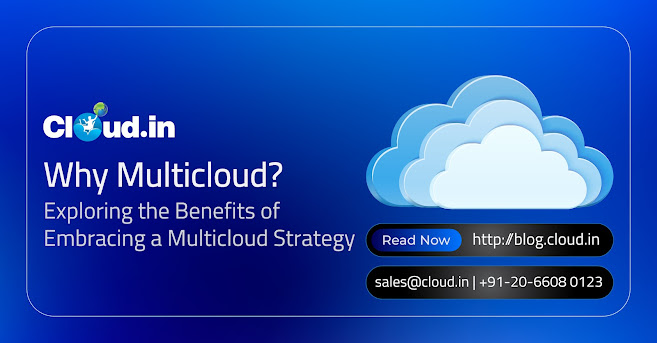
In today's digital age, businesses are increasingly adopting cloud computing to drive innovation, scalability, and agility. While the cloud offers numerous advantages, many organizations are recognizing the value of multicloud environments. In this blog post, we will delve into the reasons why businesses should consider a multicloud strategy, exploring the benefits it can bring to their operations, flexibility, and overall digital transformation.
1. Avoid Vendor Lock-In: One of the key advantages of multicloud is the ability to avoid vendor lock-in. By leveraging multiple cloud service providers, organizations can distribute their workloads across different platforms, mitigating the risk of being dependent on a single vendor. This flexibility empowers businesses to choose the best services and pricing models from different providers, optimizing their cloud infrastructure based on specific needs.
2. Improved Resilience and Redundancy: Multicloud environments offer enhanced resilience and redundancy. By spreading workloads across multiple cloud platforms, organizations can minimize the impact of potential service disruptions or outages. If one provider experiences an issue, operations can seamlessly shift to another cloud environment, ensuring continuous availability and minimizing downtime. This redundancy can significantly improve business continuity and customer satisfaction.
3. Optimal Performance and Scalability: Different cloud providers offer unique capabilities and strengths. With a multicloud approach, organizations can strategically allocate workloads to the most suitable cloud platforms based on performance requirements, geographic locations, or specialized services. This allows businesses to optimize performance, achieve better response times, and scale resources more efficiently, ensuring a seamless experience for end-users.
4. Cost Optimization: Multicloud strategies provide opportunities for cost optimization. By leveraging multiple cloud providers, organizations can take advantage of competitive pricing, negotiate better contracts, and optimize their spending based on workload characteristics. Additionally, organizations can choose cloud services based on cost-performance ratios, ensuring that each workload is allocated to the most cost-effective provider without compromising performance or security.
5. Enhanced Security and Compliance: Security is a top priority for businesses operating in the digital landscape. Multicloud environments offer improved security and compliance capabilities. By distributing workloads across multiple cloud platforms, organizations can implement diverse security measures, reducing the risk of a single point of failure. Furthermore, they can choose providers with specific security certifications and compliance standards that align with their industry regulations.
6. Future-Proofing and Innovation: Multicloud strategies provide organizations with a future-proof approach to technology adoption. As new cloud technologies and services emerge, businesses can leverage the flexibility of multicloud environments to incorporate the latest innovations without being limited by a single provider's roadmap. This agility enables organizations to stay at the forefront of technological advancements and adapt quickly to changing market needs.
Conclusion: As businesses navigate the ever-evolving digital landscape, embracing a multicloud strategy offers numerous benefits. From avoiding vendor lock-in and achieving improved resilience to optimizing costs and enhancing security, multicloud environments provide the flexibility and agility necessary for successful digital transformation. By strategically leveraging multiple cloud providers, organizations can unlock the full potential of the cloud, ensuring optimal performance, scalability, and innovation in their operations.
Written by, Suvarna Jadhav, Manager - Strategic Partnership & Alliances (Cloud.in)

%20(1).png)
No comments:
Post a Comment